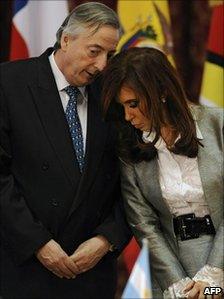Obituary: Former Argentine President Nestor Kirchner
- Published

Nestor Kirchner and his wife Cristina were seen as a political team
Nestor Kirchner, who died on 27 October at the age of 60, was arguably Argentina's most influential politician.
He was president from 2003 until 2007, when his wife Cristina Fernandez de Kirchner succeeded him.
But his presidential career began inauspiciously when he came to power by default.
After winning 22% in the first round, he was due to face a run-off when his rival, former president Carlos Menem, withdrew from the race.
Once in office, he oversaw the stabilisation of Argentina's economy, at the time mired in crisis and was seen by many Argentines as tackling poverty and unemployment.
In 2005, he took the major step of renegotiationg terms on most of the country's $100bn (£63bn) privately held debt.
A year later, he paid off the $9.8bn debt to the International Monetary Fund (IMF), which he blamed, along with many ordinary Argentines, for much of the country's financial woes.
Military abuses
The speed and determination with which he acted on the human rights front also surprised many in the country.
He persuaded Congress to repeal two amnesty laws which had protected military officers accused of abuses during the dictatorship of 1976-1983.
Mr Kirchner and his wife, both members of the Peronist party, the Justicialist Party, were often seen as a political team. She was his close adviser while he was president and he in turn was a key player in her administration.
His time in office, which came to be known as the K Era, continues to a great extent to this day, with President Fernandez pursuing a very similar economic agenda.
He was a member of the Argentine congress and secretary-general of the South American regional grouping, Unasur.
Mr Kirchner, who trained as a lawyer, had a long career in politics, and had been the governor of Santa Cruz, an oil-rich province in Patagonia.
There was widespread speculation that he was preparing to run for the presidency in 2011 in a bid to keep the Kirchners' grip on the presidency going.
But his ill-health had cast doubt on these reports.
He had undergone two operations this year for blocked arteries.
- Published27 October 2010